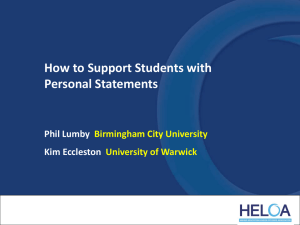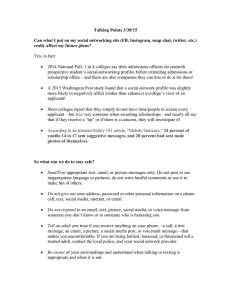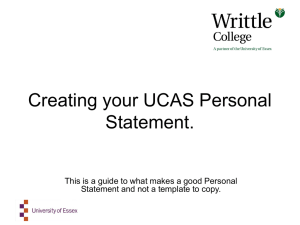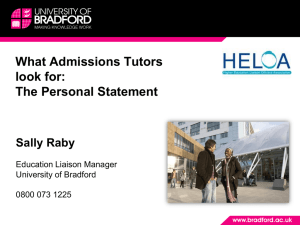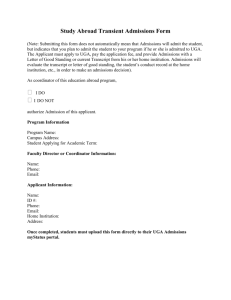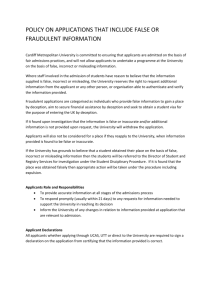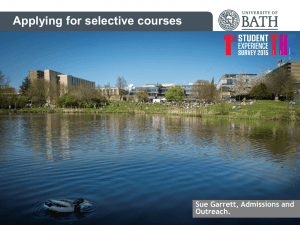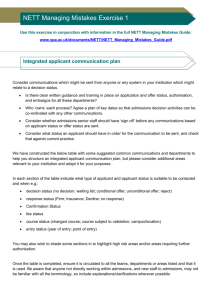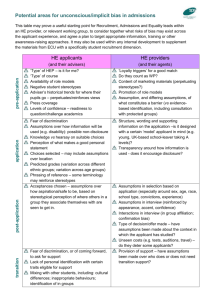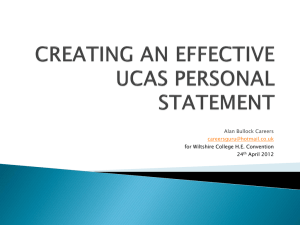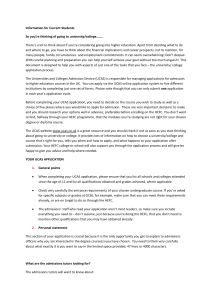UCAS Application Form and a good supporting
advertisement
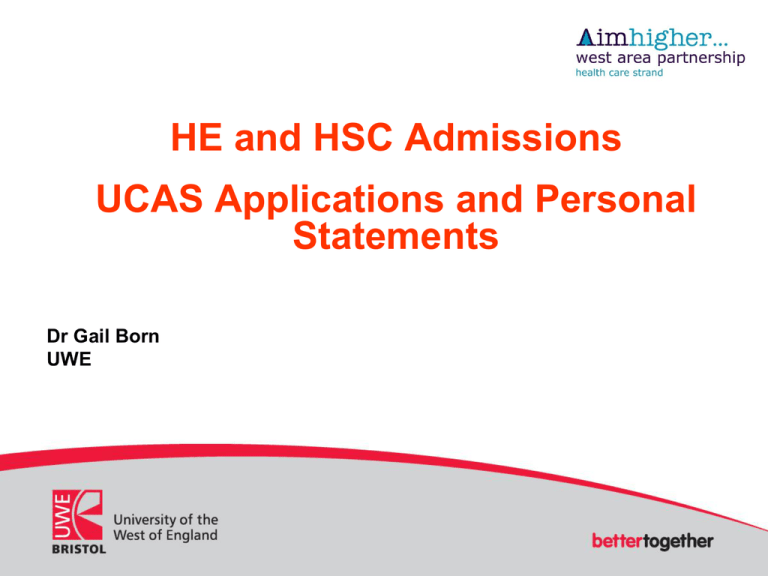
HE and HSC Admissions UCAS Applications and Personal Statements Dr Gail Born UWE What are admissions tutors looking for? ‘The single thing that impresses me most is a clear passion for the subject.’ ‘Evidence of extra reading and perhaps a brief discussion of areas they find interesting is always a good sign.’ The students who stand out clearly demonstrate vocational commitment, so have taken time to visit an audiology department, spoken to an audiologist about what the job involves…’ What are admissions tutors looking for? ‘I like candidates to be honest and explain (briefly) why they have followed a slightly unusual progression to HE. I’m not asking for hard-luck stories, but it does help to get a more rounded picture of the individual.’ ‘One thing I see regularly is a statement saying something like 'I am aware of the wide range of patients that physiotherapists work with' - or words to that effect, as you can see a statement like that does not provide any evidence of this being true, it merely suggests that the applicant perceives that they are aware of the broad range which may or may not be true! Not a long list but a few examples are helpful to demonstrate they do have some idea.’ What are universities looking for in a good applicant? Skills What skills do they have? Decision making, leadership etc Work Experiences Any in a similar role as chosen subject? Achievements Any in similar subjects or modules as course selected? Performance What is their academic performance to date? WHAT DOES A GOOD APPLICANT LOOK LIKE? Ability & Individuality What are these? Understanding of profession What do they know, what have they done? Current studies What mix of study do they have? Lifestyle What are they looking for in a university? Expectations Predictions Predicted academic performance? Numeracy & Literacy Personal Qualities Compassion, empathy, understanding Skills and Qualities Caring Calm under pressure Good Listener Energy Interest in People Good Communicator Problem Solving Enthusiasm Empathy Team working Criminal Convictions Time Management References •Information about the course •Structure, subjects •Student’s academic abilities and interests – as much ‘hard’ information as possible – level 3 achievement •Student’s commitment, inc. time management, meeting deadlines •Social and communication skills •Recommendation for degree level study The importance of the personal statement •May be the only chance to sell themselves – all an admissions officer/tutor has to go on •Enforced self-reflection – they might learn something too! •Opportunity to demonstrate interest in the course or area of study •To explain why they have gone down the educational route that they have chosen and how it has benefited them •Biographical Questionnaire Questions to consider (and answer!) before making a start: •Have I done sufficient research into course and HEI choices? Am I confident in this? •Why do I love this subject? What is it about it that I enjoy the most? •How long have I been interested in it? •What do I love to do in my spare time? Questions (continued) •What am I proud of? What do I take pride in being able to do? •What opportunities have I taken? •Do I have any non-accredited achievements? (eg. Duke of Edinburgh) •Have I held any positions of responsibility? •Have I had work experience or a placement? If so, what did I learn from it? •What makes me a good candidate? Questions (continued) •Have I demonstrated an interest in the subject outside of school or college? (if not, do I have plans to do this?) •Have I demonstrated an interest in the subject inside school or college? (if not, do I have plans to do this?) e.g. field trips, work place visits, taster days, open days etc. •What experiences have I had that led to this choice of career? What experiences make me right for it? •Do I possess transferable skills (leadership, communication etc.) – how have I attained them? How can I use them during my studies? Having answered these questions: •Make a list of everything they want to say as well as notes based on answers to questions •Think about structure – which order makes sense? •Consider what is the most important thing to get across •Ask friends and family for advice – can they think of something that has been missed? Do….. •Try to make a strong impression but don’t be jokey or ‘quirky’, and keep it light •Demonstrate clarity about choice of subject and why they want to study it •Connect their level 3 studies and personal experiences to desired degree subject •Be enthusiastic and interested: ‘I hope to…I would like to further my knowledge of…I am looking forward to the challenge of…’ etc. •Ensure that the structure is good and that spelling and grammar are perfect (very important!) Do… •Talk about gap year plans if deferred entry has been requested •Cover all subject areas, if applying for multiple subjects applied for (be wary of doing this though as it implies indecision) •If applying for midwifery, don’t talk about a desire to work with babies and children (12:1 applicants to places, 200 interviewed for 50 places, FebApril) •If applying for physiotherapy, don’t talk about sports injuries! •Demonstrate that they are well-rounded – give specific examples •If they are not in full-time education, give details of work experience – voluntary or paid •Keep it as up to date as possible Don’t… •Dwell on shortcomings or negative things •List all level 3 subjects again (it’s elsewhere on the application) – only if relevant •Be overconfident •Be biased towards any particular university – 5 institutions will be viewing the application! •Copy any part of the statement from elsewhere (Similarity Detection Service – 10% or higher similarity reported to universities Don’t… •Try too hard - being themselves is the best policy •Leave it too late – allow plenty of time! •Underestimate how important it is •Put how old they are (that appears elsewhere on the application) or provide confidential or private information •Provide an inappropriate email address (on application form generally) Presentation •Type and perfect in Word then copy and paste into UCAS Apply •4000 characters (including spaces) or 47 lines (including blank lines) or approx. 600 words •Aim to fill the space – not too short! •Don’t use bold, italics or a different font – it won’t work •Check spelling, grammar and punctuation (again!) •Get a second (and third) opinion on what they have written – does it make sense? Does it ‘flow’ well? •Ensure that the information is all true and can be discussed further at interview (UWE guarantee the minimum of an interview for applicants on access programmes) •Keep a copy to refer to at a later date Questions? www.dayinthelife.org.uk www.ucas.com www.aimhigher.ac.uk www.life-pilot.co.uk www.thestudentroom.co.uk
